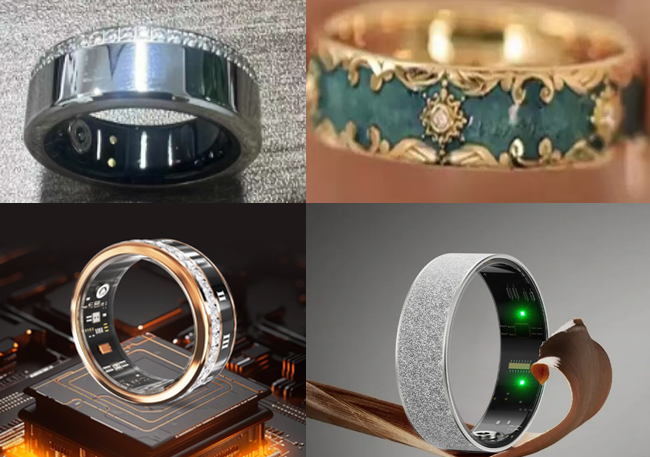Comprehensive Guide to Smart Health Devices"smart rings
Explore our comprehensive distributor guide on portable devices that support health platforms, including smart rings, 4G smart watches, and UWB smart watches. Discover the latest technology in health monitoring and enhance your health tracking experience.
10/20/20254 min read


Introduction to Smart Rings
Smart rings are innovative portable devices designed to seamlessly integrate health monitoring into daily life. These compact, wearable gadgets facilitate a range of health-related functionalities, acting as an extension of personal health management systems. Unlike traditional wearables such as fitness trackers or smartwatches, smart rings offer a discreet alternative that can be worn comfortably on a finger while collecting data on various health metrics.
The primary functions of smart rings typically include tracking vital signs such as heart rate, sleep patterns, and physical activity. Equipped with advanced sensors, these devices utilize cutting-edge technology to monitor health parameters in real time, providing users with immediate feedback and insights into their overall well-being. Many smart rings are also capable of connecting to smartphones and other health platforms, enabling users to sync their data and access comprehensive analysis through dedicated applications.
The rising popularity of smart rings can be attributed to several key factors. Firstly, their compact design and lightweight nature make them more convenient than bulkier alternatives, enhancing user comfort and encouraging consistent wear. This is particularly appealing for individuals who prefer subtlety in their health tracking. Secondly, the ease of use associated with smart rings, including straightforward controls and minimal maintenance, further contributes to their appeal. Users are increasingly seeking accessible solutions that can be effortlessly integrated into their lifestyle.
Moreover, smart rings fit into the broader ecosystem of health monitoring devices, complementing other technological advancements in personal health management. As individuals become more health-conscious and reliant on data-driven insights, smart rings present a compelling option for those looking to enhance their health management strategies. By understanding the capabilities and conveniences offered by smart rings, users can better navigate the options available within the dynamic field of portable health devices.
Key Features of Smart Rings
Smart rings have emerged as potent tools for health monitoring, combining advanced technology with a sleek, compact design. These devices offer numerous functionalities essential for users looking to maintain or enhance their health. One of the primary features of smart rings is heart rate monitoring. Equipped with sophisticated biometric sensors, these rings can provide real-time data regarding an individual’s heart health, enabling timely interventions when necessary.
Another vital feature is sleep tracking. Many smart rings utilize advanced algorithms to assess sleep quality, duration, and disturbances, helping users to understand their sleep patterns better. This capability is particularly beneficial for individuals seeking to improve their overall well-being through enhanced sleep hygiene.
Additionally, physical activity tracking is a significant attribute of these devices. Smart rings are generally designed to monitor various physical activities, from steps taken to calories burned. This information aids users in setting and achieving personal fitness goals without the bulk of traditional wearables. Another intriguing feature is stress management. Some smart rings come with integrated tools that analyze physiological responses to stress, providing valuable insights and recommendations for stress reduction.
What sets smart rings apart from traditional wearables is their unique compactness and discreet nature, providing essential health monitoring features without being overly conspicuous. Key specifications often include high-quality biometric sensors that ensure accuracy and reliability. Additionally, the connectivity standards, such as Bluetooth, allow seamless integration with health platforms, making it easier for users to keep track of their health metrics. This versatility and advanced technology collaboration make smart rings an attractive option for health-conscious individuals.
Health Platforms Supported by Smart Rings
Smart rings are gaining popularity as advanced wearable devices that can monitor various health metrics. Their ability to seamlessly integrate with leading health platforms enhances their functionality, making them valuable tools for users who prioritize health tracking and data accuracy. Among the notable health platforms supported by smart rings are Apple Health, Google Fit, and Fitbit. These platforms not only enable users to centralize their health data but also enhance the tracking capabilities of the smart rings.
When connected to these health platforms, smart rings can provide users with real-time updates on various health metrics such as heart rate, sleep patterns, and physical activity levels. The integration enhances data accuracy by allowing users to view consolidated insights on their health trends over time. For instance, through the integration with Google Fit, users can easily sync their health data and make data-driven decisions regarding their wellness routines, ultimately improving their lifestyle choices.
Moreover, collaborations between smart ring manufacturers and health platform providers have led to the development of innovative features. Work with prominent health agencies has enabled brands to refine their algorithms for better health monitoring. For example, some smart rings now incorporate advanced sensors that offer a deeper analysis of sleep quality and efficiency when synced with dedicated health platforms. This partnership allows for a smoother user experience, facilitating a transparent flow of data between devices and applications.
As the health technology landscape continues to evolve, the compatibility of smart rings with a variety of health platforms will only increase. This ecosystem not only fosters enhanced user engagement but also encourages a more holistic approach to personal health management. By leveraging the strengths of both smart rings and health platforms, users can expect to gain greater insights into their health and wellness.
Considerations for Distributors
As distributors venture into the expanding market of smart rings within the health devices sector, several key considerations must be addressed to ensure successful promotion and sales. Understanding the target demographic is fundamental; health-conscious consumers primarily include fitness enthusiasts, individuals monitoring chronic conditions, and older adults seeking lifestyle improvements. Identifying the needs and preferences of these groups will facilitate tailored marketing strategies that resonate with them.
Sales techniques should embrace both direct engagement and digital marketing. Demonstrating the functionality and benefits of smart rings through interactive experiences at trade shows, health expos, and community events can forge personal connections with potential customers. Additionally, creating informative online content, such as blogs and social media posts, can elevate awareness and educate consumers about the health benefits associated with these innovative devices.
Effective marketing campaigns should highlight how smart rings can seamlessly integrate into various daily activities, enhancing a user's health and wellness journey. Using testimonials, case studies, and endorsements from health professionals can also bolster credibility. Building partnerships with health and wellness influencers can further amplify outreach, tapping into their established audiences.
Inventory management will play an essential role in ensuring that distributors can meet consumer demand without overextending resources. Implementing a robust inventory tracking system allows distributors to analyze sales trends and make informed reordering decisions. Proper customer service is equally critical; training staff to provide comprehensive knowledge about smart rings will empower them to address customer inquiries effectively and facilitate sales.
Educating customers about how to incorporate smart rings into their health routines is vital to enhance user satisfaction and promote retention. Highlighting features such as sleep tracking, heart rate monitoring, and integration with holistic health platforms will illustrate the value of these devices. Future trends suggest a growing consumer interest in wearables, indicating that distributors need to stay ahead of technological advancements in the health devices market to maintain competitiveness.
